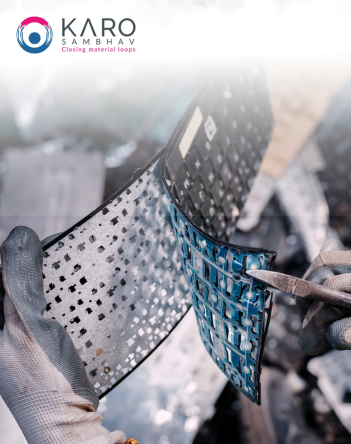Karo Sambhav collaborates with leading organisations to jointly develop industry frameworks, standards, governance mechanisms, systems and processes that advance the transition to circular economy. know more about our alliances.
Are you aware of the whopping volumes of batteries disposed of as material waste today? If reports are to be believed, more than 3 billion batteries are tossed out in the US every year. Surprisingly, the numbers in India are unquestionably at par. Battery waste is a serious problem of the present time. And why not? From the tiniest of gadgets to transportation and medical equipment, batteries are a promising source of power for everything.
Sadly, not many realise that batteries rotting in landfills release toxic chemicals into the environment. Besides, trashed batteries are a loss of raw materials and natural resources. Wondering how to tackle the increasing volumes of battery waste? It is quite possible by maximising battery recycling India.
The importance of recycling spent batteries has been reiterated over and over again. In reality, though, batteries recycling is rarely practised. Little do you know that less than 5% of batteries across the world are effectively recycled. Thus, improperly disposed of batteries continue to pile up and contribute to environmental pollution.
Hence, the importance of batteries recycling is more important than ever. Here's why:
1. Recycling batteries help keep toxic materials at bay
Batteries contain materials such as lead, cadmium, steel, zinc, mercury, lithium, cobalt, and rare earth materials that are highly toxic and corrosive in nature. Plaguing landfills with wasted batteries is hazardous for the environment. It could cause mercury poisoning and contaminate the environment with toxic pollutants. Thus, one of the prime benefits of recycling batteries the right way is to keep the toxic chemicals in batteries out of landfills and far less exposed to the environment.
2. Resource recovery
The demand for batteries is on the rise. Do you agree? Besides, the growing use of batteries implies increased mining of resources and hence, more wastage. Battery recycling India ensures that the majority of the materials in a battery are salvaged and repurposed. This naturally reduces the need to mine resources for newer batteries.
3. Recycling is an effective way to safely treat battery waste
Lithium-ion batteries contain a host of combustible and hazardous chemicals. Are you aware? Battery explosions and fires, although rare, are definitely possible. What's worse? These explosions are very hard to extinguish. Simply put, it is critical to handle and dispose of batteries with care. Mindless scrapping of batteries is more than just an environmental issue. Hence, understanding how to dispose batteries in India is important. Also, recycling the spent batteries ensures that fewer batteries are trashed in the open, causing lesser harm.
Here's a surprising fact:
A vast majority of consumers worldwide agree that the benefits of recycling batteries are monumental. Regardless of the growing willingness, the counts of recycled batteries are still quite low. Moreover, batteries are fairly recyclable too. For example, 90% of a lead-acid battery can be recycled and reused. Also, almost 50% of lithium-ion batteries are easy to recycle.
How do battery waste rules improve the scenario?
It is no surprise that environmentalists and PROs have been working tirelessly towards spreading awareness around the benefits of recycling batteries. Even then, the staggering ratios of recycled battery waste are a serious concern. This is why battery waste rules are being implemented, coercing consumers to discard spent batteries in an efficient and well-thought way.
There are ample benefits to introducing battery waste rules:
· New and legitimate rules ensure that the dependency on newer raw materials is less
· Conserve natural resources
· Encourage a smoother and widely-embraced recycling process.
To strengthen the initiative, the best EPR companies obligate consumers and businesses to comply with efficient battery waste rules. Are you wondering what EPR is all about? Well, EPR stands for Extended Producer Responsibility or an environmental policy approach that assigns producers and manufacturers the responsibility of batteries created from scratch to post-consumer use. According to the EPR obligations, all manufacturers must collect batteries that reach their end-of-life and forward the spent batteries for recycling. This ensures that no batteries are disposed of in landfills or incinerated. Besides, EPR also mandates producers to recover valuable resources from batteries and repurpose them for further use.
In addition to the environmental responsibilities, battery producers are obligated to achieve recycling targets, as set out in the reformed battery waste rules. Of course, producers can achieve the capped targets on their own or employ an authorized EPR consultant or PRO like Karo Sambhav to stay compliant with the rules. Simply put, EPR is more than just legal regulations. The responsibility mandates producers to keep tabs on the following:
· Practise safe handling of batteries and waste to avoid environmental damage and health hazards.
· Reduce dependency on new raw materials.
Further, according to the battery waste rules, producers are required to register with the 'Central Pollution Control Board,' submit their EPR proposal and file returns every year. In cases of non-compliance or failure to achieve the proposed EPR targets, the CPCB might suspend a producer's registration or impose environmental compensation. To ensure compliance, contact Karo Sambhav.
Karo Sambhav collaborates with leading organisations to jointly develop industry frameworks, standards, governance mechanisms, systems and processes that advance the transition to circular economy. know more about our alliances.





